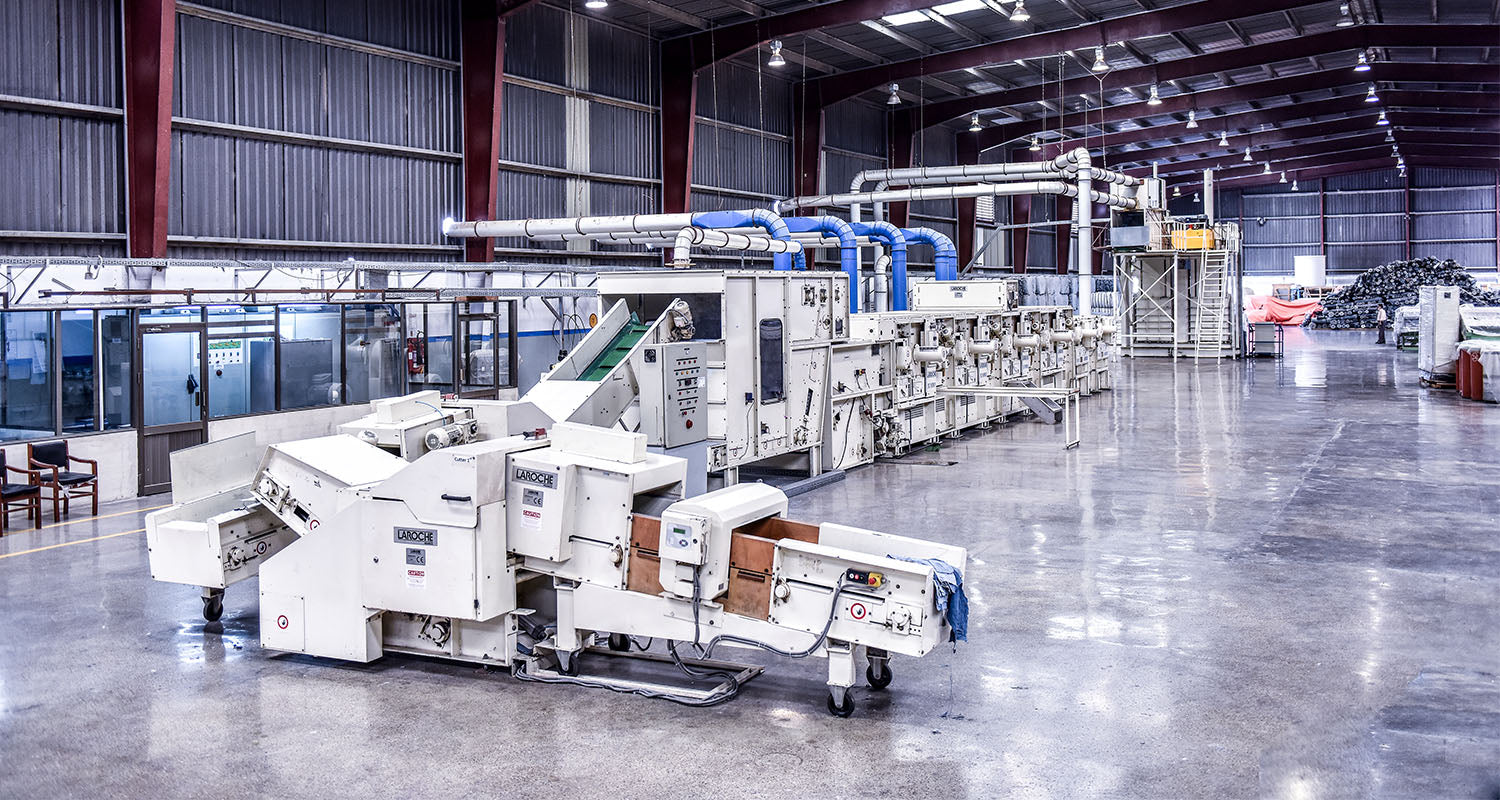THE PROCESS
OUR CONSCIOUS STRATEGY
100% kinder sourced cotton; either organic or recycled. Our mill uses proprietary techniques to eliminate waste water from dyeing and finishing processes, saving 4800 liters of water per meter.
As all seventy + mochi products use dye formulations that conform to the ZDHC MRSL this means that some rich colors can be lost during washing, therefore it is recommended to wash separately at a 30 degrees gentle wash.
RECYCLED COTTON
Recycled cotton is our hero fiber. Sourced from pre- or post-consumer cotton waste that would otherwise end up in landfills, it stands out as the most sustainable cotton option according to the Sustainable Apparel Coalition's HIGGS Index. By incorporating recycled cotton into our denim instead of virgin cotton, we achieve remarkable resource savings—98% less energy and 100% less water compared to conventional cotton farming.
ORGANIC COTTON
Organic cotton is grown using methods that minimize environmental impact, avoiding harmful chemicals and benefiting soil health. Its production requires less energy, emits fewer greenhouse gases, and significantly reduces water usage due to improved soil quality. The Global Organic Textile Standard (GOTS) certification ensures not only sustainable farming practices but also fair wages and compensation for workers. Choosing GOTS-certified organic cotton guarantees that the people behind your fabrics are treated fairly and paid a living wage.
HEMP
Hemp is a remarkable fiber celebrated for its environmental benefits. It uses up to a quarter of the water required by conventional cotton and occupies less land. Hemp enriches soil, is highly durable, and minimizes waste as the entire plant can be utilized. With a short growing season and deep roots, it improves soil structure. We source our hemp from France, ensuring sustainability through OCACIA certification, which guarantees no pesticides, GMOs, or irrigation are used.
ECO MADE ELASTANE AND ROICA
We will never use conventional elastane in our products. Instead, we choose eco-made elastane and Roica—premium degradable stretch yarns that are gentler on the environment and made with fewer harmful chemicals. We are committed to continuously seeking innovative, low-impact yarns and being early adopters of sustainable options as they arise.
We use Jeanologia's Environmental Impact Measuring tool to monitor the impact of all the garments we manufacture, making sure 100% of the collection scores LOW on the scale, creating a low impact washing process.
LASER MACHINES
We use laser machines for our vintage look fades and rips. Laser machines help us ensure worker's safety, eliminate water waste and are energy efficient.
OZONE MACHINES
We say no to hazardous hypo-chloride bleach, using ozone machines instead for vintage fades.
AERIAL DRYING
Our denim is dried on aerial drying systems to reduce the consumption of energy. 80% of the garment is dried on the conveyor, significantly reducing the time and energy required to dry the garment in an industrial dryer.
Our entire collection is consciously designed to reduce our impact on the planet and all of our components are carefully researched and selected to help us create the most sustainable products possible.
FSC CERTIFIED SWING TICKETS
FSC certification assures us that wood used in the making of paper is coming from forests that are responsibly managed, socially beneficial, environmentally conscious, and economically viable.
OEKO-TEX STANDARD 100
Our jacron paper back patches are biodegradable, vegan and are verified by OEKO-TEX to ensure they have been tested for harmful substances beyond national and international requirements.
YKK ECO FINISHED HARDWARE AND RECYCLED POLYESTER ZIPPERS
Our metal trims are made by YKK using their environment-friendly finish, which does not involve an electrical plating process, reducing the amount of water and electricity used and eliminating the use of hazardous substances. Every 1000 kg of hardware saves the average electricity consumption for one family over 20 days. Our zippers are also supplied by YKK and use recycled polyester instead of virgin polyester, helping reduce plastic from landfills.
WOVEN LABELS, POCKETING AND WASHCARE LABELS
We use certified organic cotton or recycled polyester for our labels. Our pocketing has recycled content and our wash-care labels are made from recycled polyester, helping us reduce waste.
PACKAGING
We are committed to having no single use virgin plastic in our processes. We source biodegradable packaging from material that conforms to British Standard 8472, American ASTM D6954, United Arab Emirates Standard 5009, 2009 French Accord T51-808, Saudi Standard SASO 2879, and Mexican Standard NMXE-E-288-NYCE. The listed assesses oxo-biodegradation and phytotoxicity. Part of our commitment is to continuously look at the best option for shipping that guarantees long life whilst having the least environmental impact.
Our consciously kind denim is available through our stockists in numerous countries, and we also ship worldwide for our customers. As part of our commitment to circularity, our US warehouse uses 100% recyclable poly mailers printed with eco-friendly ink. These mailers include two self-adhesive strips for easy reuse by our customers.

CODE OF CONDUCT
At seventy + mochi, we recognize that clothing production affects both people and the planet. Our mission is to produce denim responsibly and ethically, prioritizing kind practices throughout our operations. While our transparent supply chain supports this goal, we acknowledge that ongoing improvements are essential.
We are committed to enhancing the health and safety of our team members and all individuals involved in our supply chain. Our certifications reflect our dedication to these values. As a consciously kind denim brand, we prioritize the well-being of our employees and the communities we engage with.
Being present in our facilities allows us to connect directly with our team, enabling us to observe their working conditions firsthand. We ensure that every team member is compensated with a living wage, reflecting our commitment to fair labor practices.
Through effective management and compassionate practices, we strive to protect our workers’ rights and welfare. Our accredited certifications hold us accountable and ensure our commitment to transparency in all aspects of our operations.
CERTIFICATIONS
We center everything we work towards and all of our partnerships around three of the United Nations Sustainable Development Goals
RESPONSIBLE CONSUMPTION AND PRODUCTION
Effectively participate in production methods that reduce our impact on the environment, reverse the damage that the textile industry has caused and encourage responsible consumption.
GENDER EQUALITY
Empower women and girls and ensure their equal rights, access to education and participation in the workplace.
REDUCE INEQUALITIES
Support marginalized and disadvantaged communities by encouraging equal employment opportunities.
Having a simple supply chain gives us full the transparency to make consciously kind choices that are mindful of the planet and its people. The factory that produces seventy + mochi denim has been in our family for over 70 years. We are helping to pioneer a manufacturing process that reduces water, energy, and harmful chemical consumption as well as designing waste out. Below are the certificates that our factory holds to ensure that all of our products are produced to international standards.
HIGG INDEX
Manufacturers use the Higg Facility Tools to measure the social and environmental performance of their facilities. The Sustainable Apparel Coalition developed the suite of tools that is the High Index to measure environmental and social labor impacts across the value chain. With this data, the industry can identify hotspots, continuously improve sustainability performance, and achieve the environmental and social transparency consumers are demanding.
OEKO-TEX® CERTIFIED
Our factories are OEKO-TEX® certified, a program that aims to promote sustainability, transparency, and trust in the leather and textile industries. seventy + mochi is committed to a supply chain that has systems in place to ensure our products are made without harmful substances.
ZERO DISCHARGE OF HAZARDOUS CHEMICALS (ZDHC)
Our denim factory is a key signatory in the non-governmental environmental organization; Zero Discharge of Hazardous Chemicals, (ZDHC). A collaborative, multi-stakeholder initiative to eliminate hazardous chemicals from its global value chain. They are key in collectively developing advancements in sustainable chemical working practices that create a safer future for fashion.
SA 800 CERTIFICATION - SOCIAL ACCOUNTABILITY
The SA8000 Standard is the world’s leading social certification program. It is an international certification standard that encourages organizations to develop, maintain and apply socially acceptable practices in the workplace. SA 8000 certification addresses issues including forced and child labour, occupational health and safety, freedom of association and collective bargaining, discrimination, disciplinary practices, working hours, compensation, and management systems.As well as setting workplace standards worldwide, SA 8000 also embraces existing international agreements, including conventions from the International Labour Organization, the Universal Declaration on Human Rights and the United Nations Convention on the Rights of the Child.
ISO
Certifies that a management system, manufacturing process, service, or documentation procedure has all the requirements for standardization and quality assurance.
GLOBAL ORGANIC TEXTILE STANDARD
The Global Organic Textile Standard (GOTS) is the worldwide leading textile processing standard for organic fibers, including ecological and social criteria, backed up by independent certification of the entire textile supply chain.
ORGANIC CONTENT STANDARD
The Organic Content Standard (OCS) applies to any non-food product containing 95-100 percent organic material. It verifies the presence and amount of organic material in a final product and tracks the flow of the raw material from its source to the final product.
RCS AND GRS CERTIFICATIONS
The recycled content in our denim is third-party certified. Global Recycled Standard and Recycled Claim Standard are international, voluntary standards that set requirements for third-party certification of recycled input and chain of custody, set by the Textile Exchange.
CONTENT CLAIM STANDARD
The Content Claim Standard (CCS) provides companies with a tool to verify the content of specific input materials. Each organization along the supply chain is checked by an independent third party. Any type of input material may be claimed. The CCS is the foundation for all of Textile Exchange's chain of custody standards.
JEANOLOGIA
The Jeanologia's EIM tool is used to measure environmental impact of denim products, in four different categories: water, energy needs, chemical impact, and worker impact.

CIRCLE BACK
Our jeans are carefully made by people we care about and are designed to last. But if you feel your jeans have completed their journey with you, we won't take it personally. In fact, we'll take them back through our Circle Back Program and send them to our recycling facility to give them new life. We will provide you with a shipping label, and as a thank you for participating, you'll receive a credit of 15% off of one item.
Please email hello@seventymochi.com for more information.


